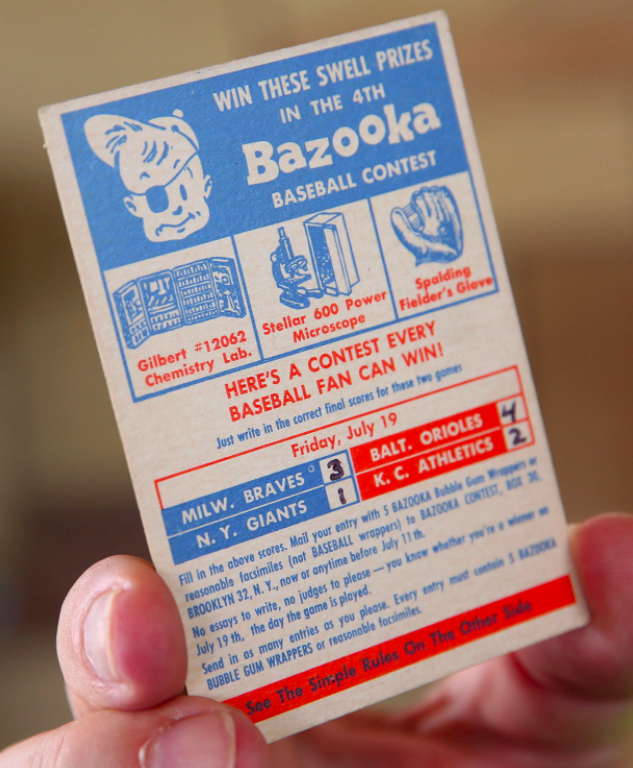How Bazooka Joe Lost a Baseball Glove
The Major League Baseball season runs from April to October, roughly. On Friday, July 19, 1957, the Milwaukee Braves beat the New York Giants, 3-1, and the Baltimore Orioles topped the Kansas City Athletics, 4-2. Today — more than sixty years later — you can look that up pretty quickly. But on July 11, 1957, predicting those two scores would have been a longshot to say the least.
That’s what Bazooka bubble gum was betting on, at least. Before the 1957 baseball season, Bazooka — which is owned by Topps, a leading baseball card company — ran a contest via a baseball card, seen below. Contestants had to correctly predict the scores of both of the two above-mentioned games and write them on the card provided. Then, they had to mail the card back to Bazooka, and include five Bazooka bubble gum wrappers. If they got the scores right, they were entitled to one of three prizes: a home chemistry set, a microscope, or a baseball glove. The deadline to enter was July 11, as seen below.

But Bazooka made a tiny mistake. The deadline to enter didn’t include the year. And because every year has a July 11th, there’s always a chance to win. Well, in theory at least. For more than half a century, that error didn’t matter at all — there are no reports of anyone trying to take advantage of that loophole.
That changed in 2016.
A Texas man named Darwin Day, then age 70, was flipping through a box of his old baseball cards and stumbled across the one pictured above. He Googled the scores of the game and filled in the right answers. He also had to get five gum wrappers, which proved difficult but not impossible; Bazooka isn’t sold as often as it was in the 50s. Day, as he told the Dallas Morning News, “stopped at a store that happened to sell Bazooka. But it came in a giant box, not in individual packages.” So he bought the whole box, took the wrappers he needed, and then gifted the gum to another shopper. That problem solved, he mailed the winning game piece and wrappers back to Bazooka, asking for the baseball glove — and then he waited for Topps to decide if he had, indeed, won.
The gum execs were surprised, to say the least; Anthony Jacbos, the general manager of the Topps company, told NBC News at first thought that “it’s someone who has maybe lost touch with reality and doesn’t know what year it is.” But after reviewing it a bit further, they realized that it was just someone trying to have a little bit of fun — and someone who, based on the rules as-written, won the contest. Topps/Bazooka agreed to meet their obligations from nearly sixty years earlier.
On September 7, 2016, Bazooka sent Day his prize, as listed by NBC: “A Louisville Slugger glove, plus a couple t-shirts, some Bazooka gum, and a pillow with the classic Bazooka label on one side and an old Bazooka Joe comic strip on the other.” But the best part, Day said, was the ruse itself. Day felt that his late brother — a fan of both baseball as well as a good joke — would have appreciated his miniature coup.
Bonus fact: Baseball cards can help predict the future, maybe. In 2010, researchers at Wayne University reviewed 230 baseball cards from the 1952 season, aiming to categorize the smiles of on the players’ faces. As TIME reported, “players who had more authentic smiles—conveying a deeper level of contentment—were more likely to live longer than those who were only partially smiling, or not grinning at all.” And the lifespan differences were huge — genuinely smiling players lived, on average, seven years longer than those which weren’t smiling whatsoever.
From the Archives: Foul Tip: The story behind some R-rated vandalism on a baseball card. (The Billy Ripken card, for those who know what that means.)
